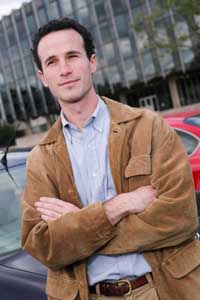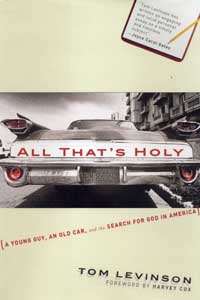Student arrives at legal scholarship via journey through American faith
By Peter SchulerNews Office
 Tom Levinson |
Levinson, who grew up in a non-practicing Jewish family, cited a high school teacher who taught a course on the history of religions as the original inspiration for what has become an enduring personal and professional passion.
“Having dismissed religion as arcane and hollow and staid, I learned from this guy that religion is actually incredibly animated, fluid and important,” Levinson said. “I realized that there is lots of stuff out there that I had just dismissed without engaging it fully.”
Levinson earned his bachelor’s degree from Princeton University and then attended Harvard University Divinity School. He then began to collect oral histories to find out how Americans viewed their religious faiths. All That’s Holy recounts his cross-country travels during the summer of 1999, a mobile project that evolved into more than documentation.
“The more I traveled, the more I recognized the need to be open about my own spiritual journey. I realized I was shortchanging myself by not having a true conversation about who we are and how we got here.” He said he believes there is an enduring impulse in Americans “to have a personal yet practical faith” that continues to inform the larger communal and political spheres.
Levinson noted that 95 percent of polled Americans have said they believe in God and half the population said they attend religious services once a week. “America is an incredibly secular place in many ways, but I learned that summer that we’re also permeated with spiritual hunger and intensity,” he said.
Following his summer research, Levinson moved to Chicago and took a position as the development director of the National Interfaith Committee for Worker Justice and wrote his book during his off-hours.
That experience eventually led him to law school. “In the course of my work, I was often dealing with attorneys from large firms who were working for our organization pro bono, and I began to feel I was missing something—missing skills and missing the tools to have a larger, practical impact on the world around me,” he said.
 |
Now that Levinson has merged his formal and informal educations in his first book, he now is talking with various scholars at both the Law School and the Divinity School to develop a vehicle—a series of interdisciplinary lectures—to explore where religion and law meet.
His next move after law school is a legal practice that would include representing individuals and organizations deprived of the free exercise of their religious beliefs—with writing more books definitely part of the plan.
“I’d love to be a practicing lawyer and be able to write at the same time.”
![[Chronicle]](/images/sidebar_header_oct06.gif)